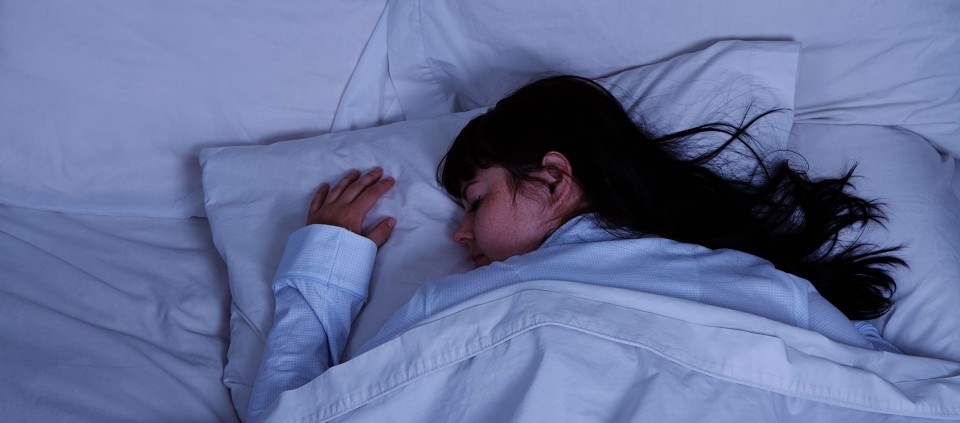Five Tips for a Better Night’s Sleep

According to the National Sleep Foundation, adults need about seven to nine hours of sleep a night. Yet according to a Gallup poll, Americans only average about 6.8 hours, a number that has continued to dwindle over the years. It’s not surprising, then, that most of us are walking around with at least some amount of sleep deprivation. And it's been well documented that lack of sleep contributes to a variety of negative health consequences, including problems with mood, attention, weight management, emotional regulation, and increases in blood pressure.
Many factors create obstacles to good sleep: long work days, parenting, technology, too much caffeine or alcohol. Yet when we’re able to allow our bodies and minds to take in the deep, nourishing rest that sleep offers, we benefit greatly. A truly restful night’s sleep can strengthen our immune system, as well as help us mentally process our day and feel emotionally balanced.
So how can we harness more of this important, but at times elusive experience? Below are five tips to help you get a better night’s sleep.
Sleep in a room that is cool, dark, and comfortable. Research shows that a cool room contributes to a good sleep. That's because our body temperature needs to drop in order for us to be able to sleep soundly. It's also important for the room to be dark, as our bodies are programmed to be sensitive to light. Even the glow of an alarm clock can mess with our circadian rhythms. If you use an alarm clock, try placing a small cloth or magazine over it so that you still have the alarm, but avoid the light. Consider how else you can make your bedroom cozier. How comfortable are your bed and pillows? Do you like having plants in the room? Check in with yourself and see if you can come up with ways to make your room feel like your own little nest.
Have a wind-down routine. When it comes to sleep, our bodies and minds like routine and predictability. And our nervous system needs time to unwind from the day. If you are struggling with sleep, notice what you are doing before bed. Are you focused on an intense mental task—such as doing work or binge-watching TV ? If so, this could be contributing to a poor night’s sleep. If you want to maximize your sleep, try turning off the TV and putting away your smartphone 30 to 60 minutes before bed. Swap that for an enjoyable—but not too intense or stimulating—magazine or book.
A nightly wind-down routine is also a great opportunity to practice some soothing mind-body techniques. Try 10 minutes of deep breathing or meditation, or do a few restorative yoga poses. You might be surprised by how much an intentional practice before bed can make a difference to your overall sleep quality.
Try to find small times to relax throughout your day. You would not expect a car to go from 100 miles an hour to zero, so if you're going at full speed all day, a 30-minute wind-down before bed might not be enough. With that in mind, try to weave in short practices throughout your day to help pull yourself off the gas pedal. Try taking a few slow, deep breaths on your way to or from work. Or practice five minutes of meditation on your lunch break.
If you can’t sleep, get up. It has been well noted by sleep experts that if you can’t sleep, it is better to get out of bed than to lie in it, tossing and turning. Your mind is an association machine. When you're lying in bed feeling frustrated because you can’t sleep, you are programming your mind to associate your bedroom with agitation. Get up and out of bed, even if just for a few minutes. Try reading on the couch or practicing a little yoga. You might be surprised by how much more easily you will fall back to sleep when you get back under the covers.
Skip the coffee; go for the Ayurvedic drink. Even a cup of coffee in the late afternoon can keep some people up at bedtime. Instead, consider an Ayurvedic tonic of a warm cup of milk (dairy or non-dairy) with cinnamon, ginger, and a dash of nutmeg.
While it can take a little patience and time for some of these tools to begin to bear fruit, it is well worth the effort. A good night’s sleep will help you feel better, and could even help you live longer.
Find out about upcoming programs with Angela Wilson at Kripalu.
© Kripalu Center for Yoga & Health. All rights reserved. To request permission to reprint, please email editor@kripalu.org.
Angela Wilson, LMHC, RYT 500, is a Kripalu faculty member who has conducted research and written about the intersection between yoga, Western psychology, and science.
Full Bio and Programs